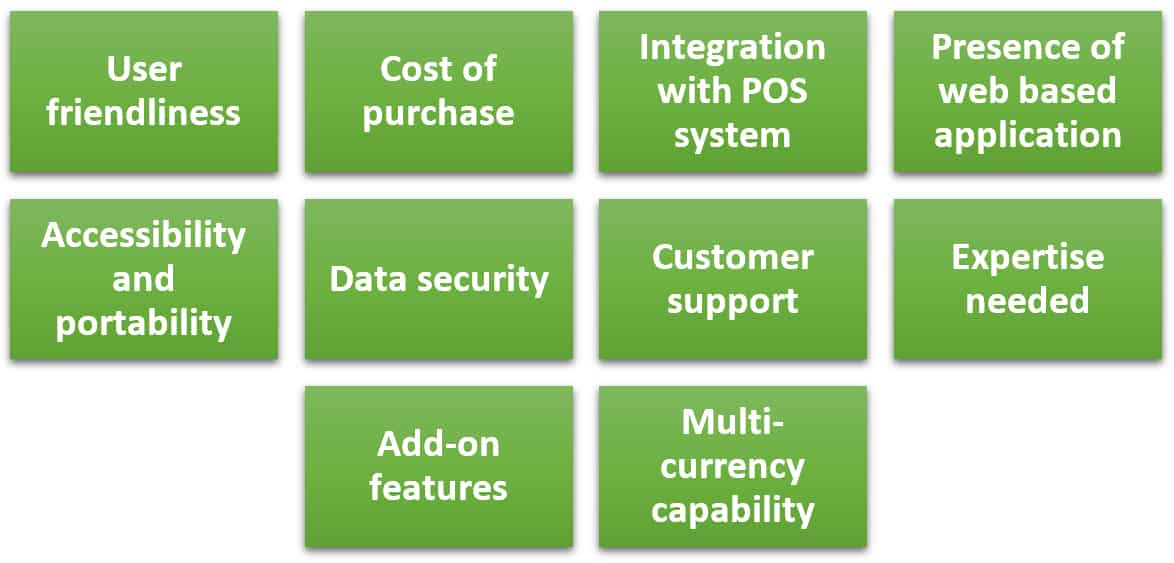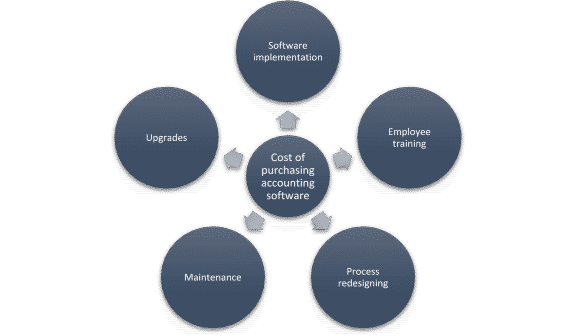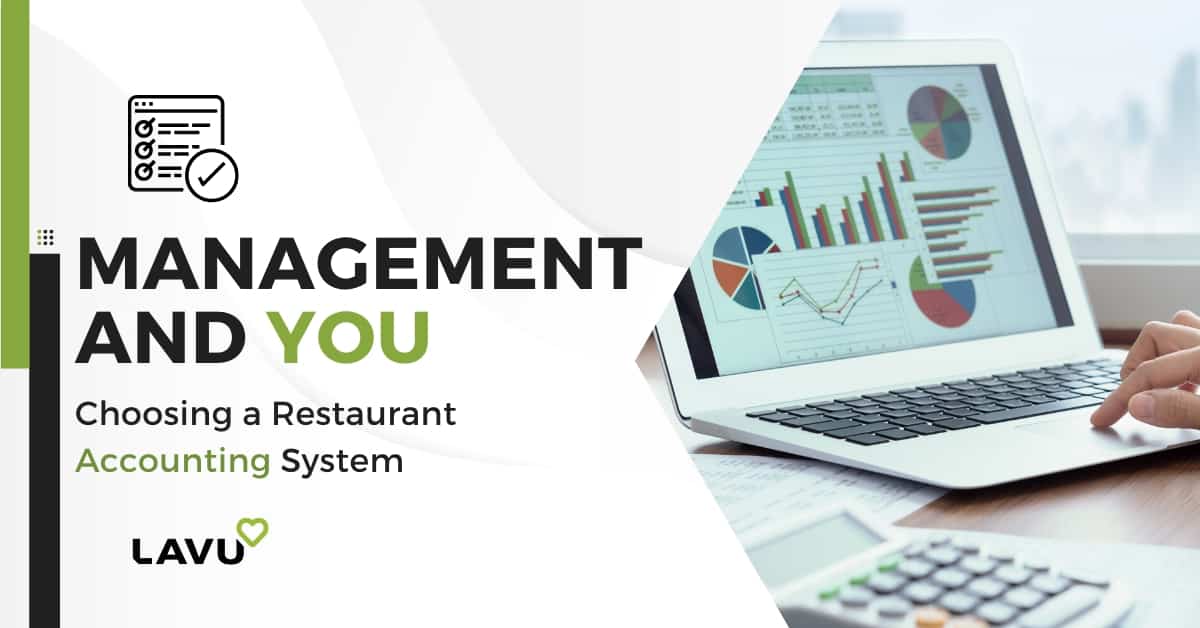
Choosing a restaurant accounting system sounds easier on paper than the actual process of knowing what to consider before making the choice. You need to consider whether you need web-based accounting software, integration of the accounting software to your POS system, the cost of purchasing the system, and other important factors. For first-time buyers, choosing an accounting system can be an uphill task, especially if you do not know what you are looking for. Before you make your choice, understand that restaurant accounting is different from accounting in other industries. Therefore, your choice should be made very carefully.
The role of an accounting system in a restaurant cannot be overlooked. Businesses no longer do their books manually or use Excel spreadsheets for their accounting purposes. Instead, they install accounting software that can automate the whole process. Even small businesses are now shifting from the paper-pencil accounting to a more digitized and optimized way. But how do you choose the right accounting system for your business? This article will explain some of the essential factors that you should consider to help you make the right choice:

- User Friendliness
One of the prime factors that you should consider before purchasing an accounting system is ease of use. User-friendly accounting software comes with an easy-to-use dashboard, where you can review your chart of accounts and determine the financial status of your restaurant. You should see the amount of cash that came in and went out of your business across different periods of time. You should see the amount of money the business owes the suppliers, revenue generated, and all financial activities in one place
User-friendliness is a key factor when choosing a restaurant accounting system because not everyone is knowledgeable about accounting concepts. In fact, many restaurant owners have limited knowledge of what accounting entails. User-friendly accounting software will serve you better and give you a better chance to understand what the process entails. Choosing complex and advanced software will only make your life harder as you will have a difficult time trying to interpret the data derived from the system. You may also waste a lot of time and effort trying to figure out how the system works.
- Integration with Your Restaurant POS System
When choosing restaurant accounting software, make sure you go for the one that integrates properly with your restaurant POS system. The software should integrate seamlessly with your POS system without the need to purchase another supporting system or software. Failure to choose the right software can be detrimental to your business and disrupt the smooth running of your operations. It would also mean that you may need to buy additional software tools if you update your POS system or if you add more functionalities to your business model.
The accounting system that you choose should not just integrate into your restaurant POS. It should also be fully compatible with the POS system and your way of conducting business. Any factors that make it incompatible would mean your operations will no longer be running smoothly. You will likely end up wasting a lot of time and effort trying to reconcile data from each system. To ensure you choose the right software, have a look at the requirements before making the purchase and compare them with the requirement of your POS system. Also, contact the vendor and inquire whether their accounting software is compatible with the POS system you are using in your restaurant.
- Presence of Web-Based Application
Cloud-Based software is a major feature in today’s accounting systems. As a restaurant owner or manager, you will prefer to choose an online accounting system that allows immediate backup of your accounting data. A web-based accounting system provides you with ready access to your accounting data and financial information any time and anywhere. This enables you to keep in touch with your restaurant financial data on-the-go and make data comparisons whenever needed. It also allows you to collaborate with your accountant and restaurant staff to speed up the accounting and decision-making processes.
- Accessibility and Portability of the System
The accessibility and portability of the system is a key indicator on the suitability of the system to your business. Restaurant accounting software that installs on a network server may be suitable for a single location restaurant business. If you run a multiple-location restaurant business, you may need to consider how all employees will access the accounting software. You will have to go with an accounting package that integrates accounting data from all the locations and allows all your employees to access it easily.
As you think about the accessibility and portability of the accounting system, you also consider the accounting software features needed to run the system. Some of the key system functionalities may include the ability to create invoices and statements, store vendor and customer information, track daily transactions with account numbers, track inventory with purchase orders, and create weekly/monthly reports. While all these may be key factors to a good accounting system, ask yourself whether they represent your business model. Probably you might require different software or additional features that allow you to meet all financial and tax compliance requirements.
- Data Security
In the current era of big data, where data is readily available, security is an issue of concern. You need to choose a restaurant system that keeps your data safe from being hacked or lost. Investing in a web-based accounting system is both an effective and easier way of keeping your data secure, compared to storing it in a desktop system. A web-based accounting system allows you to save your restaurant financial data on the external servers, protecting it from hacking and any kind of physical hazards in your business. Ensure that the system backs up your data as often as possible to avoid unnecessary loss of data. Although many restaurant owners tend to hesitate using external servers, it is actually the most effective way of keeping the data safe. Your data will be saved on the latest technologies and be protected from any imminent threats.
- Cost of Purchasing the Accounting Software
The price that you have to pay to acquire restaurant accounting software is critical. If you are a small business owner, you will be looking for affordable software that still provides all the essential features. Bigger restaurant owners may have the financial muscle to purchase more expensive systems, but it is crucial to stick to your budget. The amount you choose to spend on the restaurant accounting system should be feasible. As much as this is a capital investment, you need to be cautious about how much money you are investing. Look at the size of your business, the amount of revenue generated, and how much you can spend on this investment without affecting the smooth running of your business.

The cost of a restaurant accounting system does not stop at the initial price of purchase. You also need to consider the cost of licenses, any supporting tools needed, future upgrades, and whether you will be paying for subscription features. Compare this information among the available technical support packages to ensure you are getting the best package for your restaurant.
- Customer Support Services
Whether you are buying a basic or advanced accounting system, you need to work with a vendor with a sound customer support service. Your restaurant staff will need support from the system expert to ensure they understand how to use it. This will also help in completing the integration process of the system into your restaurant operations. If proper support is not provided during the implementation phase, the transition will be delayed and daily operations of your restaurant affected.
Customer support should also include system maintenance as your business grows. You need to ask yourself whether the restaurant accounting system you selected is scalable and will grow as your business grows. Most software vendors in the market offer discounted and upgradable applications. This allows you to upgrade the restaurant accounting system to a package that covers new features of your grown business. When combined with the availability of technical support, you can be sure your business operations will not be affected.
- Expertise Needed to Use the Software
Before installing any system in the daily operations of your restaurant, consider whether you have the right expertise to operate it. Even if you purchase a powerful and do-it-all restaurant accounting software, it will be useless if your employees are unable to use it. Consider the education level of your employees and whether you need to hire a restaurant manager to oversee the implementation and use of the software. While some software may require high-level accounting knowledge to set-up and use, others will come as plug-and-play ready for immediate use. If additional expertise is needed, think of the cost you will incur training your employees. Avoid last-minute surprises or incurring costs that you had not planned for.
- Check on the Available Add-On Features
Accounting systems that come with add-on features provide additional functionalities. The add-on features allow you to do better accounting and achieve more accurate results. Some of the attractive add-on features include the ability to access the software remotely, integration into your restaurant POS system, online payment capabilities, ability to generate comparison trends from the reports, tax capabilities, and more.
The question of what features the accounting system offers needs to be completely answered. Do not just focus on the general overview of the system, but go into details to find out the role of each feature. Determine whether the features address the accounting processes you use in your restaurant and if they meet your expectations. A good way of ensuring you are getting a good deal is to compare add-on features among various vendors. This will give you a clear picture and opportunity to find out whether available software meets the needs of your business.
- Multi-Currency Transactions Support
With multi-currency transactions becoming more popular in restaurants, an accounting system that supports such transactions may come in handy. If your restaurant is serving overseas clients who pay in different currencies, then this is the right kind of software for your business. It will help you record and analyze transactions in your base currency to ensure your business is still profitable. You do not have to keep on converting currencies before doing any accounting task. This step will be automated, making the work easier and more accurate for you.
Which Accounting Systems Can You Choose for Your Restaurant?
As noted earlier in this article, the best accounting system for a restaurant is web-based or online. An online system, also known as a cloud-based accounting system ensures both the safety and easy accessibility of your financial data. Some of the most reputable software offering such features include Intuit QuickBooks Online, Sage 50, Xero, Dynamics GP, Netsuite, and OneAccounting Software. You can also use a service like Sourcery to integrate any of the popular accounting software to your restaurant management applications. When choosing the software, consider your business needs, ability to hire an accounting professional, and your bottom line.
The scope of your business is an important guiding factor in ensuring you purchase the right accounting software. To avoid making any unnecessary errors, document the accounting tasks you want the system to perform. Collaborate with your accountant to ensure you got all the areas written in the paper. Once you have stated the basic accounting requirements for the software, make a list of other items that you want the software to handle. This may include inventory management, payroll, and cost accounting, depending on the type of restaurant business you run. Also, consider the future of your business as you make such decisions. Which current operations are likely to change and which ones are likely to be introduced? Will any of the changes fit well with the software selected and does the software support the expected change?
As you consider a restaurant accounting system for your restaurant, you will need to choose from a wide range of options. However, making the right choice depends on whether the software will meet the needs of your business. Does it have the tools and features that you need to meet the accounting needs of your restaurant? This should be your leading question throughout the selection process to ensure that you do not just select the best option, but also the most appropriate and relevant for your business.

